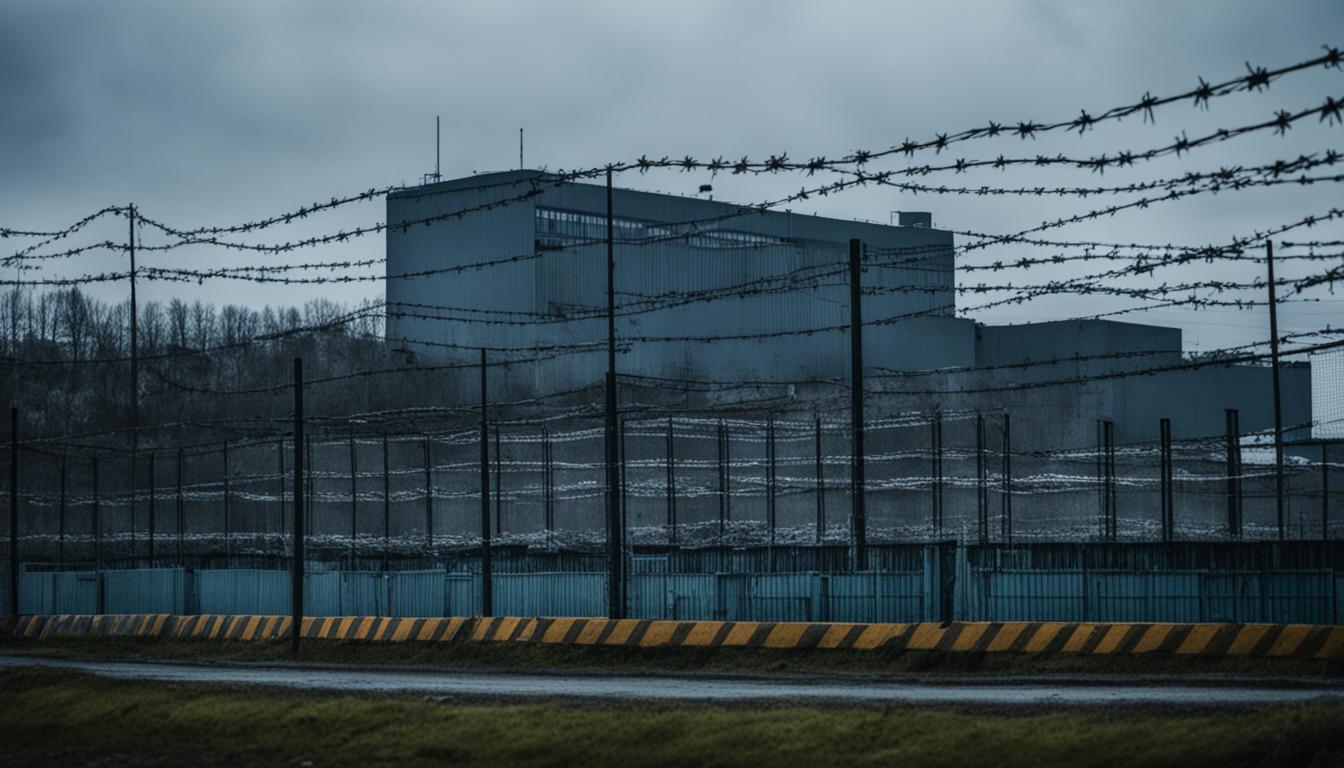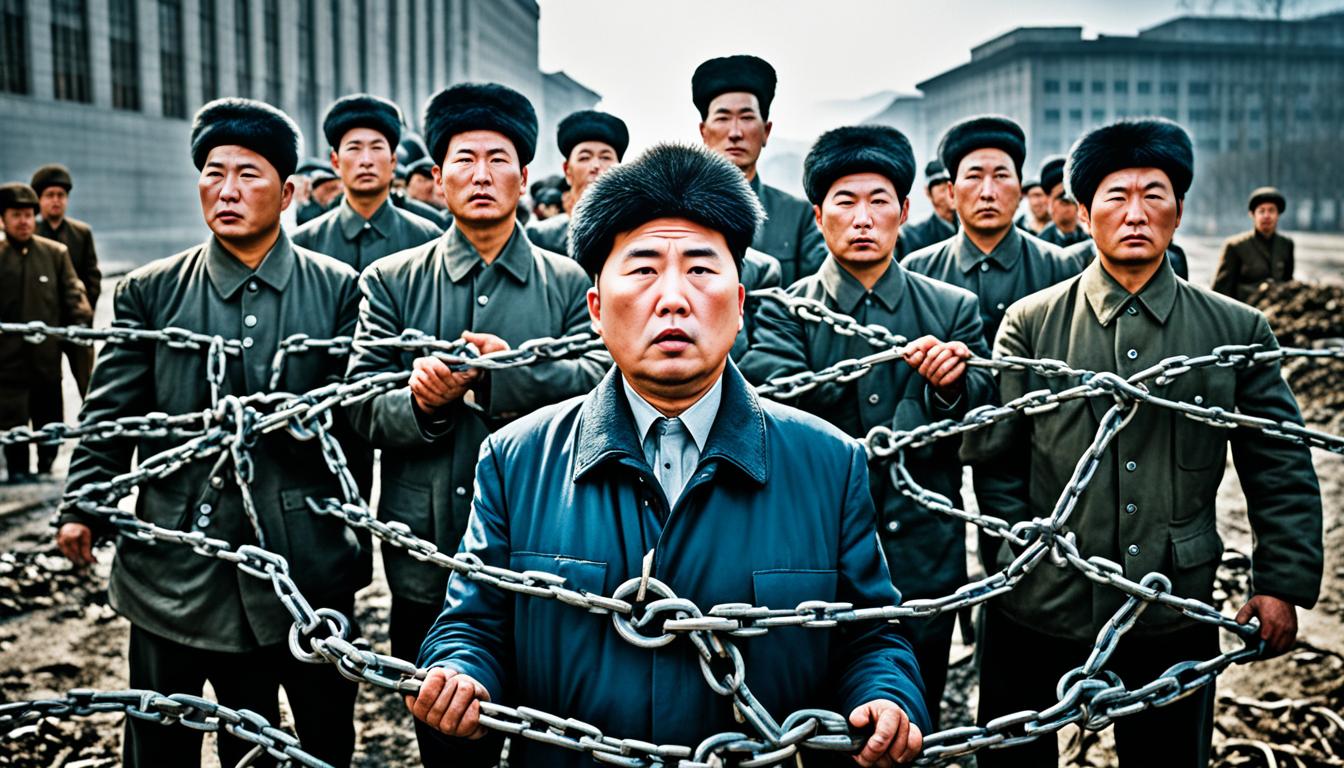
With the world job market changing fast, knowing the rules for jobs in different places is critical. Lately, people have started to worry about how North Koreans are employed in Europe. This brings up issues about worker rights, trafficking, and slavery.
North Koreans are working in Europe, like in Poland, across various jobs. But, their work has made us question things like worker rights, human trafficking, and slavery. It’s crucial we look into the laws about North Korean workers in Europe. This can help make sure they’re treated fairly and their rights are protected.
This piece will cover the rules for North Koreans working in Europe. It will talk about the laws, visa rules, and how working abroad is handled. We’ll discuss the struggles North Koreans face. We’ll also talk about what governments and groups are doing. And we’ll see how it all impacts workers and the world economy.
Key Takeaways:
- North Korean workers have been employed in Europe, raising concerns about labor rights and human trafficking.
- European regulations and employment laws play a crucial role in ensuring ethical employment practices.
- Visa restrictions and overseas employment regulations impact the presence of North Korean workers in Europe.
- Efforts are being made to address the issue, including the suspension of visas and international sanctions.
- Collaboration between governments, businesses, and civil society organizations is necessary to protect the rights of North Korean workers and eradicate forced labor.
North Korean Workers in Poland and Europe
North Korean workers are sent to Europe to work in various fields. They work in tough conditions and often face exploitation. This raises concerns about human trafficking.
Poland has welcomed many North Korean workers, especially in its shipyards. Their presence has fueled talks about labor exploitation and the rightness of hiring them.
Bringing these workers to Europe involves getting state permission first. They go through training camps. Then, North Korean diplomats help with their travel and visas. Some workers have more freedom than others, who are tightly controlled at their jobs. This raises worries about their well-being and job rights.
Currently, around 482 North Korean workers are in Poland. They make up less than 1% of all work permits there. Even with this small percentage, their presence in Europe alarms many about labor exploitation and trafficking.
Detailed numbers of North Korean workers in Europe:
| Country | Number of North Korean Workers |
|---|---|
| Poland | 482 |
| … | … |
These numbers underline the need for more attention to work conditions in Europe. It’s important to protect North Korean workers and fight against exploitation. The global community should join hands to tackle human trafficking and labor abuse. This is crucial for protecting everyone’s rights in Europe.
Legal Stipulations for North Korean Workers in Europe
North Korean workers ready to work in Europe must meet certain legal demands. This means they need the right visas, permits, and work documents as per each European country’s rules. These papers help control and make sure North Korean workers follow the local labor laws.
Even though officials aim to safeguard North Korean workers’ labor rights, bad reports exist. These reports talk about mistreatment and breaking the rules for some workers.
“Efforts have been made to address these issues and safeguard the rights of North Korean workers under European labor laws,”
The European Commission is determined to stop any breeches of the law that harm labor rights. They can start legal actions against countries allowing these violations.
Knowing and following the laws in their work country is very crucial for North Korean workers. This helps protect their rights and well-being while working in Europe.
International Concerns and Actions Against North Korean Forced Labor
The use of North Korean forced laborers in Europe has sparked worries worldwide. People are concerned about human trafficking and slavery. This issue is a big violation of work rights and creates a kind of slavery today.
The world has taken big steps to deal with this. The United Nations has put global bans on North Korea. The aim is to stop the misuse of money earned by the workers for making weapons. The UN also stopped other countries from hiring North Korean workers. Furthermore, the United States made rules to punish anyone involved in sending North Korean workers abroad.
Fixing the problem in Europe needs a team effort from countries around the globe. To really fight human trafficking and help those abused, we must work together. Combining our strengths, countries can make a big difference. Together, we can create a world that respects the rights and dignity of all who work.
“Labor rights abuses, such as human trafficking and slavery, can only be effectively eradicated through strong international cooperation and collective action.” – International Labor Organization
Actions taken by the international community:
- Imposing international sanctions on North Korea to deter labor rights abuses and prevent funds from supporting weapons development programs.
- Enacting measures to sanction parties involved in the exportation of North Korean workers.
Key goals of international cooperation:
- Combatting human trafficking and slavery through collaborative efforts.
- Protecting the labor rights of individuals subjected to forced labor.

Measures Taken by Poland and Other Countries
Poland has taken steps to stop North Korean forced labor. They have stopped giving visas to these workers. This is to keep a closer eye on their work conditions and rights. The goal is to stop exploitation and support the workers’ well-being. Other European nations are also doing similar things to fight this issue.
Laws about the job market have gotten stronger. Europe is doing more checks to ensure workers from North Korea are treated fairly. They want to make sure companies are doing what they should for these workers.
Organizations that fight for human rights have really helped. They’ve made more people aware of what’s happening to North Korean workers. Because of them, these workers are finding more support in their fight for justice and fair treatment.
Examples of Labor Market Regulations in European Countries:
| Country | Regulations Implemented |
|---|---|
| Germany | Toughened penalties for employers violating labor rights |
| France | Introduced stricter labor inspections and increased fines for non-compliance |
| United Kingdom | Enhanced protection for workers’ rights through legislation |
The actions taken by Poland and others show their strong dedication against worker exploitation. They want to make sure North Korean workers are treated right. It’s crucial that these labor laws are enforced. And, the fight for these workers’ rights must go on with help from human rights groups.
Impact on North Korean Workers and the Global Economy

North Korean workers in Europe face tough conditions. They are being exploited, which affects their rights and health. This situation has big effects on both the workers and the worldwide economy.
The money they send back to North Korea is another big issue. These financial remittances help the North Korean economy. This income might also fund the country’s weapons programs.
The world is trying to help these workers by putting sanctions on North Korea. They also banned North Korean workers from going abroad to work. This is to stop the money they make from supporting North Korea’s nuclear plans.
Challenges Faced by North Korean Workers
“The workers are subjected to harsh working conditions and labor exploitation, which undermine their rights and well-being.”
North Korean workers have it tough. They face long working hours, get paid little, and work in unsafe places. These problems lead to their exploitation.
Their freedom is also restricted. This makes them even more likely to be exploited. They’re often not allowed to leave their workplaces. This makes them feel alone and even more exploited.
This issue shows a bigger problem with labor migration and how workers are treated. This affects not just North Korean workers, but also the entire world’s economy and trade policies.
The Global Economic Implications
The exploitation of North Korean workers is bad for their rights and the global economy. It causes several problems:
- Economic Exploitation: This kind of work harms fair labor and the economy. It makes the global supply chain unbalanced and unfair.
- Financial Remittances: Money sent to North Korea helps the economy. But, this money might also support making weapons, which is dangerous for everyone.
- Labor Migration: Workers moving to other countries for jobs shows the issues with labor migration. It’s hard to protect worker rights and have fair practices.
- Economic Sanctions: Putting sanctions on North Korea shows the world’s need for good labor standards and trade practices.
- International Trade: The way North Korean workers are treated makes us question if governments and businesses are doing enough. They should ensure workers are treated fairly in all different countries.
We need to stop the exploitation and work for fair work conditions. By making sure workers are treated well, we move towards a better and fairer economy.
| Economic Exploitation | Financial Remittances | Labor Migration | Economic Sanctions | International Trade |
|---|---|---|---|---|
| Undermines fair labor practices | Contributes to North Korea’s economy | Raises questions about worker rights | Demonstrates commitment to labor standards | Highlights the responsibility of governments and businesses |
| Perpetuates economic exploitation | Potentially supports weapons programs | Complexities and challenges of labor migration | Curbs labor rights abuses | Ensuring ethical practices |
Ensuring Ethical Employment Practices in Europe
To ensure ethical employment in Europe, everyone needs to help—governments, businesses, and groups in society. Companies must be responsible and make sure their products are made the right way. They should check that no one is forced to work and that everyone’s rights are respected.
It’s key for companies to check and inspect their supplies often. This stops the exploitation of North Korean workers. It also makes sure all workers are treated fairly. By making their supply chains clear, companies help protect labor rights and keep their workers safe.
Groups that fight for workers’ rights are very important. They teach about forced labor from North Korea and push companies to do the right thing. By working with these groups, companies can learn how to be better at following ethical work rules.
Furthermore, governments must enforce strong labor rules. By doing this and checking on companies regularly, they help make sure work is safe and fair. This holds companies responsible and helps workers enjoy their jobs more.
Benefits of Ethical Employment Practices
- Promotes fair labor practices and upholds labor rights
- Enhances corporate reputation and builds trust with customers
- Attracts socially conscious consumers and investors
- Reduces the risk of legal and reputational issues
- Creates a positive working environment and promotes employee satisfaction
- Contributes to sustainable development and the achievement of social and environmental goals
“Ethical employment practices not only benefit workers and businesses but also contribute to the overall well-being of society. By prioritizing labor rights and supply chain transparency, we can create a fair and just working environment for all.”
Best Practices for Ethical Employment
Here are some best practices businesses can adopt to ensure ethical employment:
- Conduct regular audits and inspections to monitor labor conditions in supply chains
- Implement clear policies and codes of conduct that prohibit forced labor
- Collaborate with labor rights advocacy organizations to improve practices
- Provide training and education on labor rights and ethical employment
- Establish grievance mechanisms to address labor rights violations
- Promote supply chain transparency by sharing information about suppliers and their labor practices
| Benefit | Description |
|---|---|
| Enhanced reputation | By prioritizing ethical employment, businesses can build a positive brand image and gain the trust of customers and stakeholders. |
| Reduced risk | Adhering to ethical employment practices helps businesses avoid legal and reputational risks associated with labor rights violations. |
| Improved productivity | A fair and ethical working environment fosters employee satisfaction and productivity, leading to better business outcomes. |
| Sustainable business | Ethical employment practices contribute to long-term business sustainability and support the achievement of social and environmental goals. |
Image depicting the importance of supply chain transparency in ensuring ethical employment practices.
Conclusion
Using North Korean workers in Europe is a grave issue we should not ignore. These workers are exploited through forced labor, raising serious concerns about their rights. We need stronger rules and checks to protect them and to have fair work standards.
Steps have been taken to solve this, with Poland stopping North Korean worker visas and global sanctions in place. Yet, we still have a lot of work. We need to completely remove forced labor and ensure these workers’ rights. Joining forces between countries, companies, and groups is the key to making real changes and stop exploitation.
Together, we can end the suffering of North Korean workers in Europe. Let’s do our part in protecting their rights and stopping human trafficking. Let’s aim for a future where all work is fair, and every worker is valued and respected.
